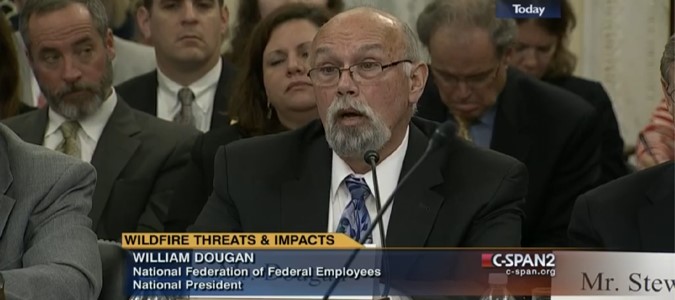
On November 5, NFFE National President William R. Dougan testified before the U.S. Senate Committee on Agriculture, Nutrition and Forestry regarding the threat wildfires impose on public and private lands. In his testimony, President Dougan tapped his wealth of knowledge stemming from 22 years as a US Forest Service firefighter to inform the committee of the problems land management agencies face when fighting fires. Most notably, President Dougan outlined how the current system of interagency fire-borrowing is “robbing Peter to pay Paul” and suffocating the U.S. Forest Service’s other important forest management work – including hazardous fuel reduction activities. President Dougan also discussed the importance of passing the bipartisan Wildfire Disaster Funding Act, which changes the way the most catastrophic one percent of wildfires would be funding – allowing the Forest Service to greatly scale-down its fire-borrowing. Below are excerpts from President Dougan’s testimony. Read the full written testimony here, or watch the full hearing here. (President Dougan’s testimony begins at 35:31)
I can tell you, firefighting is dangerous business. When you’re on a fire, the only thing between you and trouble is your equipment and the brave men and women with you on the fireline. That’s why it is so important that we arm firefighters with the training and resources they need to be safe and complete the mission.
The wildfire problem in the U.S. is growing. Seven of the worst fire seasons since 1960 have occurred in the last 15 years. This year nearly 54,000 wildfires have burned 9.4 million acres, compared to the 10-year average of nearly 69,000 fires burning 6.5 million acres. We must recognize that this is the new normal, and we must change the way we do business to account for it.
***
The attrition rate for wildland firefighters is alarmingly high. I’m proud that my Union worked with Representatives Gerry Connolly, Don Young, and Rob Bishop in the House, and Senator Testor in the Senate, on The Land Management Workforce Flexibility Act. I would like to thank Senator Johnson for his assistance in bringing the bill forward for a vote, where it was passed by unanimous consent and signed into law by the President in August. For a wildland firefighter, experience is hard-earned on the fire line. Prior to passage of this legislation, the firefighter career path was blocked by flawed and dysfunctional federal regulations which prevented long-term temporary employees from being able to advance their careers. Because of this barrier to career advancement, many skilled firefighters eventually left, taking their valuable skills with them. With this legislation signed into law, it will ensure that these long-term temporary employees are allowed to compete fairly for permanent positions when they become vacant, thereby retaining critical skills within the fire workforce. I’m disappointed to report that we are still waiting for OPM to issue implementation guidance to federal agencies. Unfortunately, while we wait, hiring for next year’s firefighting workforce is already underway. Pending OPM guidance, agencies are not considering long-serving seasonal firefighters for career positions under merit promotion. If this doesn’t change within the next few weeks, the knowledge loss we’ve been seeing for too long already will continue another year.
***
Funding for wildfire suppression continues to be a problem. With the occurrence and severity of wildfires increasing, the portion of the budget that goes to fire suppression and preparedness has increased dramatically. In FY 2015, the overall fire management budget for the Forest Service was $2.5 billion; of that, $708 million was for fire suppression and $303 million was in a special account for firefighting. This is a 60 percent increase from a decade ago. The expense of fighting wildfires often exceeds the funds appropriated for wildfire suppression. When this happens, agencies transfer funds from other programs into firefighting accounts to cover the shortfall. This so-called “fire borrowing” results in cancellations and delays in the agency’s on-the-ground program of work. In FY 2015, the Forest Service was forced to transfer about $700 million from other programs in order to be able to continue to pay for suppression costs after initial funding was exhausted. Ironically, many of the cancelled projects are those designed to reduce the frequency and severity of catastrophic wildfires. It’s “robbing Peter to pay Paul,” and it costs taxpayers more. We urge Congress to pass the Wildfire Disaster Funding Act (S. 235 and HR 167) to address this.
In addition to ensuring that there is sufficient funding available to pay for wildfire suppression costs, reduction of hazardous fuels in our forests and within communities existing in the wildland-urban interface must be part of a holistic strategy to reduce the risk of wildfires escaping initial attack and becoming catastrophic in nature. Simply increasing the suppression budget by itself will not be effective in reducing the impacts of wildfires.

NFFE President Dougan testifies to the challenges the government faces in fighting wildfires
